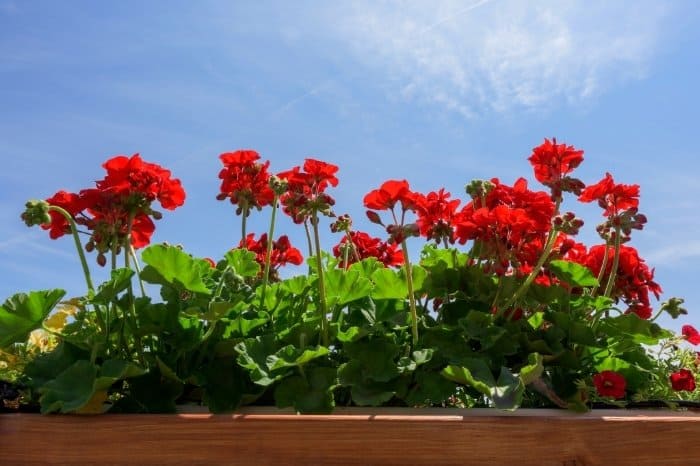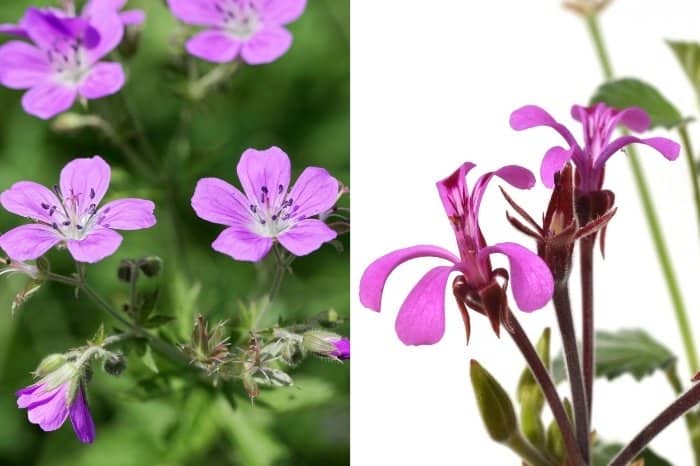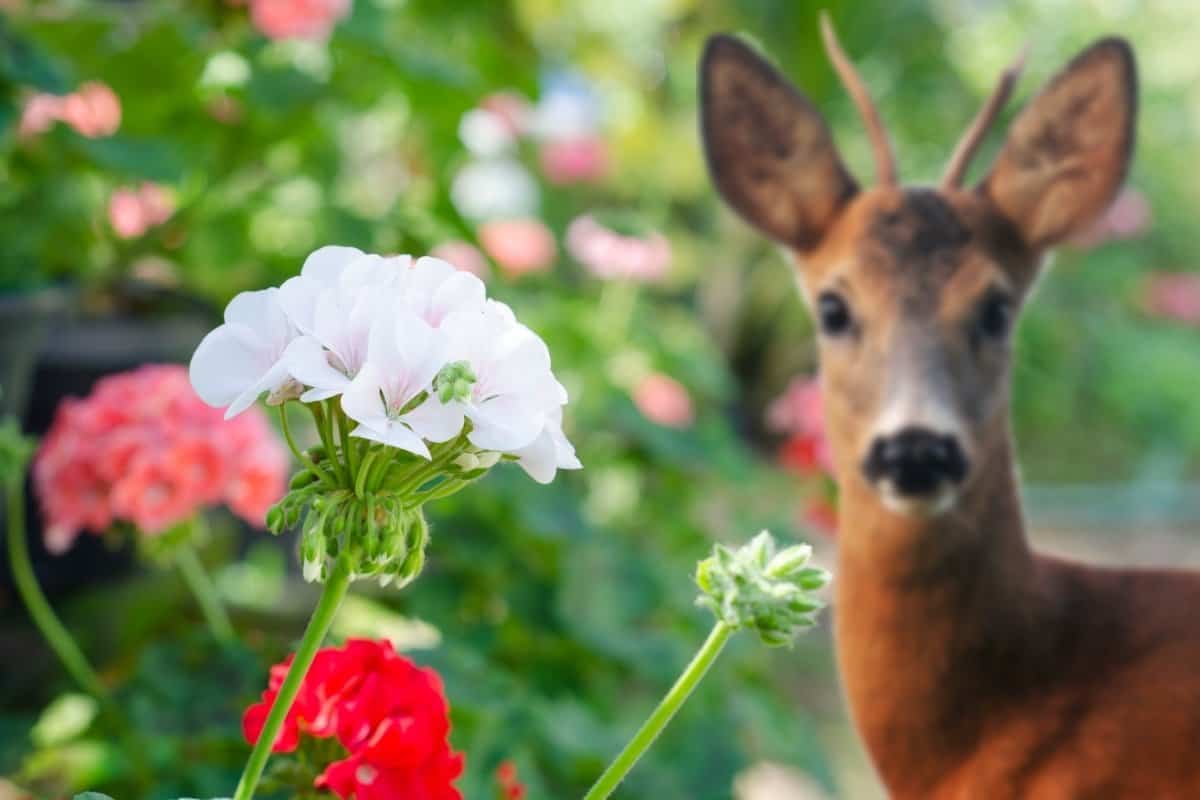Last Updated on December 18, 2021 by Cristina
Are geraniums deer resistant? It is vital to answer this question before growing geraniums if living in areas with a high deer population.
A garden full of geraniums is a delight for every gardener. Geraniums are easy to grow and a popular choice among many gardeners who grow them around their homes. Simply plant your geraniums from cuttings, provide plenty of sun, don’t overwater them, and you will reap great rewards
Geraniums are also available in various scents – fruits, nuts, mints, and even fruit scents. This means there is something for everyone depending on the scent you love.
There’s nothing more awful than having your beautiful plants eaten down by deer. This discourages your cultivating a fault making you lose motivation to keep gardening. They offer to avoid making any assumptions about geraniums being eaten by deer it is best to look at them closely.
Are Geraniums Deer Resistant?
So do deer eat geraniums? No. Most of the deer species do not like the smell and taste of geraniums at all. In fact, geraniums are commonly grown as deer repellent plants that ward off deer away from your garden.
Deer-resistant plants are plants that deer do not enjoy eating. These plants have a pungent scent a bitter taste or high toxicity levels that causes deer to stay away from them.

Deer Eating Preference
Before we get deeper into the question will deer eat geraniums let’s first understand what deer prefer.
Deer are herbivores. Their diet includes nuts, plants, shrubs, and fruits along with all the parts of the fruit tree. Do you prefer narrow-leaved evergreens and fertilized plants?
Examples of narrow-leaved evergreens are tulips, violas, daylily, English ivy, holly, hostas, pansies, wintercreeper, and rhododendron.
Is Geranium Deer Resistant 100%?
Even though dear does not eat geraniums they are not 100% deer resistant. Deer eat geraniums out of desperation. Geraniums are not usually desired bye dear they’re actually avoided.
In the history of gardening, there is no way you can completely deer-proof your garden with deer-resistant plants. If the deer is in the right mood it will eat your geraniums. What does this mean? This means when the season gets colder from October to February orphan deer will not access the kind of plants they like. To survive they are likely to eat anything in their path.
Also depending on their population. If deer have a high population in your area and they have eaten up the rest of their favorite food they will eat geraniums. Please note that deer do not eat geraniums as a favorite meal, they feed on them to survive when the season is tough.
Botanical Interests”Deer Resistant” Flower Seed Collection – 10 Packets with Gift Box
To make your geraniums more deer-resistant, plant other deer-resistant plants together with geraniums. You can mix geraniums with peonies sage foxgloves lavender irises and daffodils. Consider mixing these deer-resistant plants so that each backs up the other in repelling the deer.
Using a mixture of deer-resistant plants with each contributing a specific repellent feature protect your plants. For example plant foxglove and daffodils together because they are toxic and repel the deer with their toxicity. Plants like lambs ear or the Iranian mint lavender and bass do not attract deer because of the texture of their leaves.
The Two Types Of Geranium Plants
Geraniums are available into genus groups that include:
Geranium Genus – This type is more hardy and resistant to most climatic conditions. These geraniums have their origin in the temperate parts of the world and the mountainous regions of the tropics. There are also available in the eastern part of the Mediterranean and have over 422 different kinds. They thrive in cooler climates.
Pelargonium Genus – This type is more tender with bright flowers that are easy to take care of and bloom from spring until fall. This genus has over 700 different types and thrives in warmer climates. They are more common than the other genius and planted in many gardens today across the world.
If you observe carefully, they usually turn their nose up when they smell geraniums because of their strong pungent scents. When they consume them they act as an appetite snatcher causing them not to eat much the rest of the day.

How Do Deer React To The Toxicity Of Geraniums?
Deer will only eat a small percentage of geraniums. They do so to mix with other plants in order to neutralize the toxic effects
Deer are ruminants. Ruminants are also known as cud chewers and have a stomach made of four Chambers. These four chambers help with the digestion process that makes them less susceptible to any illnesses related to toxic plants. The lower the toxicity level the better to mix in with their diet.
The higher the toxicity levels the higher chances of deer becoming in or having a hard time digesting what they have eaten. Therefore they eat a mixed diet in order to resist the effect of toxicity.
From their characteristics, geraniums are considered deer repellent and many gardeners plant them to ward off deer from destroying their gardens. They have managed to do so even though not 100%.
Other Ways To Repel Deer
Use a smelly mixture to ward off. To make this mixture, beat your eggs in a bowl and add water while still beating. Sprinkle this mixture over your geraniums to keep the deer away. However, you will need to make a new batch each time it rains.
Train your dog to scare away the deer. If your dog is a great hunter, the better! If not much of a hunter, you can also collect its hair and spread it around the ground near the geraniums. The hair and the dog’s scent will deter the deer because they will think there is one in the area.
Set up an electric fence around your garden to protect your geraniums. These fences have peanut butter feeding points that shock them when they lick the butter. The deer learns to stay away from your property.
Final Thoughts
Should you notice that your homemade solution is not s strong as you expect, you can buy a commercial one. There are many repellants in the market you can choose your favorite from Amazon or any other online market.
Caroline is a gardener who loves to get down to the nitty–gritty of gardening. She proudly proclaims herself as a ‘dirt worshipper‘ and can often be found deep in the garden, covered in soil and singing to her plants. As a self–proclaimed ‘plant whisperer‘, Caroline believes that plants need love and attention just like any other living thing, and she loves to give them both. When she‘s not tending to her garden, you can often find her researching the latest gardening trends, or teaching others how to make their gardens thrive



